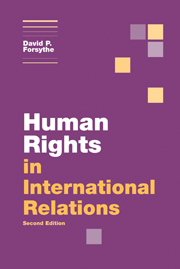Preface to the second edition
Summary
In writing the second edition to this work, I have been initially guided by the old axiom: if it's not broke, don't try to fix it. The response by students and faculty to the first edition has been such, including translation into five foreign languages, that I have left unchanged the basic approach and overall structure of the book. The emphasis remains on the transnational policy making process concerned with internationally recognized human rights. The nine chapters remain the same in subject matter content.
At the same time, the world has not stood still since the first edition was written in the late 1990s. So a number of changes have been made within chapters to account for various developments: the creation of the International Criminal Court, including the selection of its first prosecutor; a renewed debate about international humanitarian law (for human rights in armed conflict) and whether it has become passé in an “era of terrorism”; an accelerated debate about “humanitarian intervention” and its possible misuse in places like Iraq; further developments about the mainstreaming of human rights in the United Nations system; an updated evaluation of the multifaceted efforts to link human rights with the behavior of transnational corporations; an on-going debate about the importance of socio-economic rights compared to civil-political rights; shifts in US foreign policy since September 11, 2001, which affect many things in international relations, given the great power of that state; and so on.
- Type
- Chapter
- Information
- Human Rights in International Relations , pp. vii - viiiPublisher: Cambridge University PressPrint publication year: 2006



